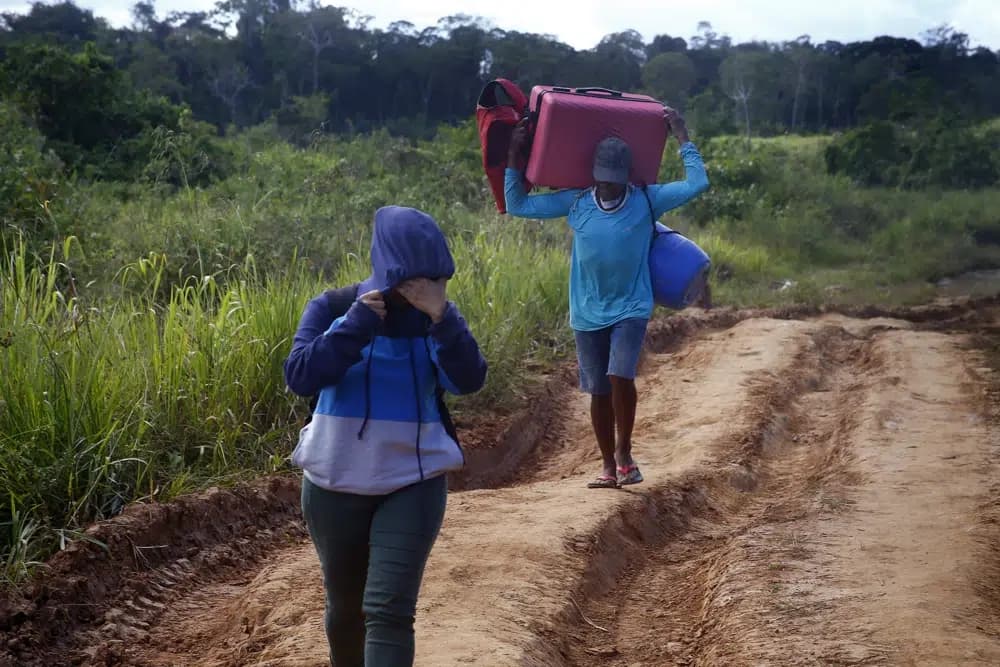SÃO PAULO – An agency of Brazil’s Catholic bishops conference is pressing for accountability regarding illegal mining operations in a 24 million acre region of the Amazon designated by federal law as an indigenous territory, in which resource use is supposed to be determined by the native Yanomami people.
Observers claim that some 20,000 miners have been operating illegally in the area in recent years. Brazil’s new President, Luiz Inácio Lula da Silva, who took office in January, has promised they will all be removed.
The crisis came to light at the end of January, when pictures of skinny Yanomami children and elders were released by an indigenous organization to demonstrate the humanitarian problems many villagers face, struggling with both famine and malaria.
The images shocked many in Brazil, and led the new government to take immediate measures such as the distribution of food and medicine kits and the transfer of seriously ill persons to hospitals in the city.
Meanwhile, the government also began carrying out raids against the mining operations, forcing many of the workers, who are often themselves poor, to flee by boat or on foot to evade arrest. Some began posting internet videos begging for government help to leave the area.
Some members of Lula’s administration have expressed sympathy for the miners.
“Beyond the criminals, there are workers who support mining, poor people who depend on it to eat. They are completely unsheltered now,” said Defense Minister José Múcio Monteiro during an interview with a Brazilian radio station.
Such statements have led the Indigenous Missionary Council (CIMI) of Brazil’s bishops’ conference to sound an alarm about the need for justice and accountability. According to CIMI analysts, the incursion in Yanomami territory by illegal miners is the main reason behind the healthcare crisis.
Not only has mining been contaminating the soil and the water with heavy metals, they say, but also the deep pits dug by miners during gold exploitation and then left behind are perfect breeding places for malaria mosquitoes.
For years, critics say, mining companies also perpetrated direct acts of violence against the Yanomami, with numerous cases of menaces, killings, and sexual aggression denounced by the indigenous group.
“We consider that the government is adequately dealing with the healthcare crisis. But combating illegal mining requires a more unified stance from the government,” Luis Ventura, a national coordinator of CIMI, told Crux.
Ventura mentioned that some cabinet members have been saying that it would be too difficult to charge each illegal miner.
“The government controls the federal police and the intelligence agency, so it can take measures to adequately hold them accountable. Otherwise, it will send the message that violence against indigenous peoples is secondary,” he argued.
Local authorities of Roraima State, where most of the Yanomami territory is located, have been affirming that poor miners should be helped by the government and that the region’s economy depends on mining, so it should be properly regulated and not combatted.
That’s the position, for example, of Governor Antonio Denarium of Roraima, whose own sister is under investigation for allegedly taking part in money laundering operations to favor illegal mining.
“For more than 40 years, the political elite from Roraima has been saying that gold is the solution for the state’s poverty, and that illegal mining draws poor workers who are not criminals, so it would be ideal to regularize it, not to ban it,” Ventura said.
The same rhetoric, he said is being voiced now to avoid a broad anti-mining push.
CIMI released a statement on February 10 affirming that “violence against the indigenous peoples cannot be naturalized” and that “impunity is unacceptable.”
“Socioeconomic measures that can incentivize the employability of the people involved in mining are fundamental,” the statement read, “but such actions cannot be taken to the detriment of the necessary investigation of the crimes perpetrated against the Yanomami.”
According to Archbishop Roque Paloschi of Porto Velho, who heads CIMI, the need to promote inquiries on the crimes against the Yanomami is not “a matter of vengeance, but the legitimate pursuit of justice.”
“That is their territory. Can the people destroy everything because they need work? The country needs public policies to create jobs. We will not solve that problem by invading indigenous lands,” he told Crux.
Paloschi emphasized that for decades many people have been blaming the indigenous peoples for underdevelopment.
“Brazil is a country full of prejudice and racism against the indigenous peoples. We need to hold accountable all the ones who perpetrated crimes against the Yanomami,” he added.
The suggestions made by government authorities to regulate mining outside the Yanomami territory are part of the effort from powerful politicians and businessmen to keep their operations running, Ventura argued.
“Throughout Roraima’s history, such endeavors have been constantly used for money laundering, making the gold extracted from the Indigenous territory apparently legal,” he explained.
The Lula administration is formed by different political forces, gathering several parties which opposed President Jair Bolsonaro despite ideological and policy differences.
“Those forces have to be aligned and express the same views concerning the respect to the indigenous peoples’ rights,” Ventura said.
In the opinion of Paloschi, the current Yanomami crisis must be seen as only one among many affecting the indigenous peoples all over Brazil.
“Their rights have been violated all over the country. That needs to stop immediately,” he concluded.











